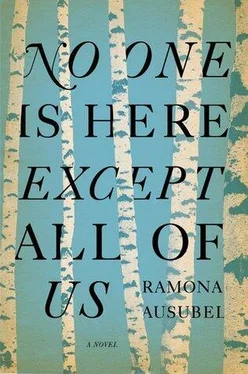I said, “A mistake,” and walked away fast. I felt like I was going crazy, caught in a crawl of biting ants. Down the length of the hallway, each bunk bursting with men or women, kids crashing into each other and laughing hard. “Where are my slippers?” a woman shrieked.
“You expect me to keep track of those disgusting old things?” a man bellowed.
“Superhero!” a little boy screamed, and ran in front of me, his arms out. The air felt sticky at the same time that it was cold. I ran up the metal stairs where the wind, the salty wind, blew my hair. I drank it in. Everything around me was either gray or blue. It was cold outside. I was cold inside. I was tired.
On the bench nearby a man in a black hat was sitting with a radio on his lap. When he saw me, recognition flashed across his face. As if he had been waiting for me to fly through the door. The man’s eyes were filled with sadness. He put his hand out to me. The hand was a beggar, destitute and hungry. “Sit, please. I can’t listen alone,” he said in English. English, I thought. The same language as the radio. That language that brought it all back. He did not ask me who I was — our names, the facts, had nothing to do with this moment. The hum in my body settled, the women and children downstairs in the bowels of the ship hushed up. I sat at his side, my parcels on my lap. Our shoulders touched. The radio filled my ears.
Here, on over an acre of land lay dead and dying people. You could not see which was which except perhaps by a convulsive movement or a convulsive sigh from a living skeleton too weak to move. The living lay with their heads against the corpses and around them moved the awful, ghostly procession of emaciated people with nothing to do and no hope of life. There was no privacy, nor did men and women ask it any longer. Women stood and squatted stock naked in the dust trying to wash themselves and to catch the lice on their bodies. Babies have been born here, tiny wizened things that could not live. A mother, driven mad, screamed at the British sentry to give her milk for her child. He opened the bundle and found the baby had been dead for days.
I was floating above myself. I tried to find my body. My feet were resting on wooden planks hammered down with dowels and beneath those were cabins where people prepared to sleep, dream, stand up to go to the bathroom and have a sip of water because their mouths were dry. Girls were in love with boys. Boys were mean to girls. Children wanted sweets, toys. I felt so lonely it almost seemed unbelievable that I myself was there. That emptiness should not be possible in a living body.
“It’s over,” the man in the black hat said. “Hitler is dead. The camps are being liberated.”
“I don’t know what those things are,” I admitted. He studied me, the clear state of disrepair, of despair.
“You are safe, that’s all you need to know. You survived.”
The man in the black hat opened a newspaper with a picture of a man with a square of a mustache. The headline read: HITLER AND HIS BRIDE KILL THEMSELVES. “He married his mistress at midnight and they were dead by afternoon. You can read it.” I put my hand around Solomon’s star in my pocket. I do not die there? I asked. Do I die at sea? Is it a matter of a cleaner, better world? Though you had no bones yet, you sloshed and rocked inside me. You sent waves out until I had to run and throw up over the side of the ship. The froth swallowed it; I could not even see what I had lost.
The man in the black hat came over and offered me a hand and a handkerchief. “Would you like to sit down?” he asked, his accent flat and songless.
“Do I die here?” I asked him.
“It’s seasickness,” he said. “It’s perfectly normal.”
“Is it a better world now that we are all dead?”
He patted my face with the little white cloth. “No one here is dead. You have made it.”
“I had four parents. I thought it would be enough to last.” I started to cry into the cloth, I cried until the thing was limp and useless. I tore my throat with air. My feet were weak with loss — so were my knees, my earlobes, my fingernails. My hair and dry, stretched skin cried. The tiny bones in my hands cried. The sea of my belly was a storm. You must have felt dizzy, washing back and forth, but your new heart did not stop pumping. We are alive , you said, we are alive, we are alive, we are alive, we are alive.
The man put his hand on my head awkwardly and patted it. “We are going to be all right,” he said. “We are on our way home.”
“Do you know me?” I asked.
“I know you now.” The man in the black hat smiled. “And it’s a pleasure. My name is Edward.”
“Are you one of my people?” I felt as if I knew him, as if he belonged to me and always had. And why wouldn’t he? Here we were in the endlessness and God had not offered a good explanation. I was alive with hands, a mouth — this story was mine to tell. I imagined the villagers running away, leaping into the river, gathered by the loving arms of the water, washed to sea, transformed. I began, “And the people turned into the boards, nails, the passengers. In the ship’s depths they became fires great enough to push this whole floating city across the world. They became the entire, unbreakable ocean.”
Edward was not afraid of me, of where I had come from. Somehow, I seemed to make perfect sense to him. In those clear eyes I saw a place to rest, a small, safe corner. Yes, you are one of my people, I thought. Of course you are. We began to move. The ship rocked on the sea, the sea which counted all the blues as its own, the sea which rolled over itself and sprayed across the bow, landing white and thick on itself.
The motion of the sea felt the same as the motion inside. Everything swam and floated. “Who are you?” I asked my middle.
I looked out and memorized the shoreline, the shape of the way back. I did not have to try hard to memorize the shape of the water because it was so flat, so deep, so endless. Against it the land looked tiny and harmless — a miniature, floating island.
Edward and I spent the whole journey together, yet I hardly remember speaking to each other. We shared food, watched each other’s things when one wanted to stand up and go for a walk. We made a small bed on deck and slept under a cloudy sky. “Good night, new friend,” Edward said each night. I do not know if I slept peacefully or wildly. If I snored or howled. In the morning, Edward handed me tea and we took our place on the bench, where before us the sea was vast and generous — she hid her treasures and her misery; only the tumbled waves were ours to see, only the surface. Ahead of us: This sea, another. The great big ocean. For weeks, our whole world was blue.
THE BOOK OF EXPLANATIONS AND ENDINGS
Curled up on the salt-sprayed deck, my head on the bag of feathers, I dreamed of the dictator’s wedding.
There were no balloons. No ribbons. There were no flags for miles along the road and no procession of shining cars. The dictator wore his green suit, of course and as always. His bride wore a green dress and green shoes and a green hat. Did she call up and order this from a shop in the city where she was born? Did she tell them it was for her wedding? Did she put her right arm up even though the person on the other end of the phone would never have known if she did?
At the moment of their nuptials, our earth was heavy over them. Many feet of ground between the wedding and any daylight. Ants and ant holes. Worms and wormholes. Gophers, rabbits, snakes, spiders and the green backs of beetles. Rainwater did its best to make it down inside their cave and drown them there.
In the cave, the dictator had had a floor installed. There were pastel-colored telephones and beds for sleeping with fresh goose feathers to fill them. The tapestry from his former living room was hung now over the wall, moist with groundwater. Ants made their way along its silken strands.
Читать дальше












